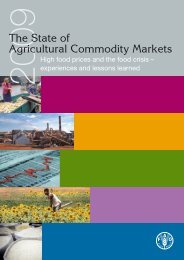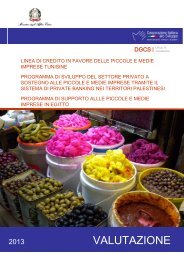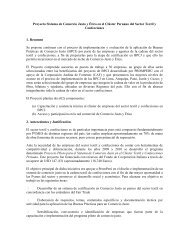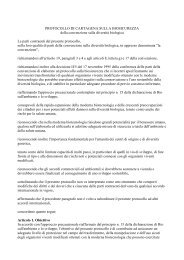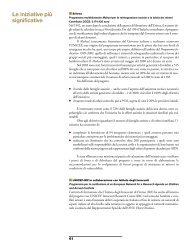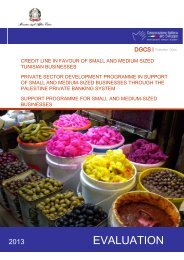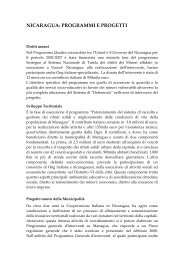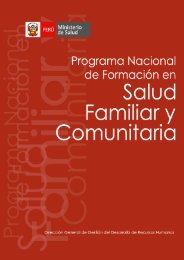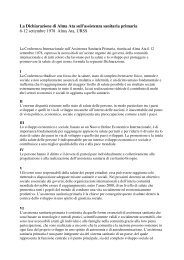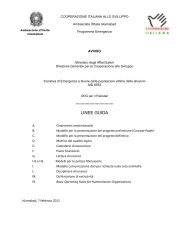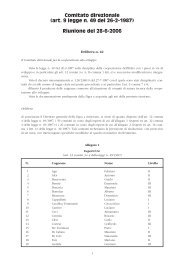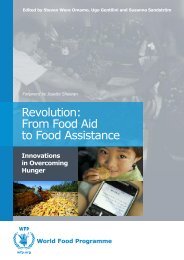The reform foresees, under Art. 1, punishment with administrative pecuniary 102sanctions of the prostitute, who for the first time, violates the prohibition ofprostitution on the street, in the case of a repetition of this behaviour, the sanctionis transformed into a criminal punishment (arrest of from 5 to 15 days and a fine offrom 200 to 1,000 Euros). At the same time the client of prostitution on the street isalso punished: first with an administrative sanction then with a fine 103 .Article 2 eliminates the crime of reciprocal aiding and abetting amongprostitutes who help each other and collaborate in the activity, and decrees that t<strong>here</strong>nting of private apartments, in which to exercise prostitution, does not constitutea crime; it is left to the inhabitants of the building and the instruments whichregulate relations under civil law the choice to forbid or limit prostitution in thebuilding.Already the first articles have produced doubts, perplexity and preoccupation inthose assigned to the work who express their fear that the law will end up hidingprostitution, making the persons who exercise this more “invisible”, less reachableby the social operators, thus increasing the victimisation and exploitation.The bill decrees the non punishability of those who, found prostitutingthemselves in the street, “result as being obliged to prostitute themselves throughviolence or threats”: it is easy to think that the criminality will adjust their ownorganisational means to the new regulative picture, with the risk of making theconditions of life worse for the women who would lose the possibility ofcontacting the operators today guaranteed on the street.Not by chance have some of the interviewed operators already imagined, if theproposal is approved, to help the women to start small business activities, perhapsunder a form of a co-operative to self-manage the activity in an apartment.And in any case it is difficult to imagine a closed up prostitution, exercisedfreely and which reduces the risks (for example health) for the users, simplyworking on the instrument of penal sanctions, without a series of regulations (forexample following the Dutch model or the attempts at zones of other places inEurope) which could affect the phenomenon and avoid or at least make lessdiffused the processes of victimisation and traffic of which so many young andvery young women are the protagonists.Improvement in the support action for the victimsThe forms of intervention foreseen under Article 18 at more than four yearssince their first experimentation, have given important results not only for supportprovided to the Nigerian victims, but also in the fight against the traffic. Accordingto the operators, in some local context - the area on the border between Marche andAbruzzo, the urban areas of Rome and Turin, for example - t<strong>here</strong> seems to be somecorrelation between the start of Art. 18 projects and the reduction of Nigerianprostitution. It is however difficult to evaluate in what measure the overall102The sanction is from 200 to 3,000 Euros.103The administrative sanction is from 200 to 1,000 Euros; the fine from 2,000 to 4,000 Euros.
eduction of the presences on the street, registered by the social operators, can beimputed to Art. 18. The sure element is that the trials made by victims bringing acharge have contributed to the increase of arrests and t<strong>here</strong>fore to create problemsfor the organisations.Serious support to the actions based on the incentive on the part of the victimsto report cannot but impress major incisiveness to fight.The sensitive change in the policies represented by the Law Bossi-Fini and theconsequent increase in resorting to round-ups, centres of permanence, expulsion,have rendered the picture more complex. The increased attention by the policetowards the phenomenon of prostitution on the street is not always accompanied asit was hoped by an increase in the collaboration in the application of Article 18.In the words of many social operators, t<strong>here</strong> emerge expressions of concern forthe policy of expulsion which risks weakening the possibility of access of thevictims to exit paths. On the one hand, the round-ups have made the organisationdistribute the victims more widely over the territory, with the consequence that“the women are more dispersed in the province, they work less in-groups and arealways more difficult to contact” (Associazione Tampep - Turin). On the otherhand, the policy of “cleaning the streets” has generated a major difficulty in t<strong>here</strong>lations of collaboration between the social operators and the police.“Before it often happened that they [the police, Ed.] asked us to mediate and tostart the discussions, when they considered that t<strong>here</strong> were perhaps people heldthat maybe needed Art. 18, because particularly motivated, or because it could beuseful with regard to a series of complaints (…). In the last period however, afterthe Bossi-Fini law, this did not happen, they repatriate them immediately and theydo not contact us” (Associazione On the Road - Martinsicuro).“For example only yesterday evening a girl who has a decree of expulsionpending but went to the lawyer to make a request for a permission to stay becauseshe had filed a report, was arrested immediately, and the police said «Excuse usbut we must arrest». The climate has changed” (Associazione On The Road -Martinsicuro).Among the themes strongly felt by the social operators, t<strong>here</strong> is t<strong>here</strong>fore stillthe necessity to improve the relations of active collaboration with the institutionalorganisms: first among these are the Questure (local State Police offices) andProsecutors. Four years since the application of the new norms, nearly everyw<strong>here</strong>t<strong>here</strong> has been much progress in the collaboration between the institutions, on theone hand, and associations, religious entities, NGOs, on the other; however t<strong>here</strong> isno homogeneity between the different local contexts and all over t<strong>here</strong> is thepossibility to improve.In the case of victims filing a report, the major slowness and uncertainty of thetime required for the proceedings has emerged in the Prosecution Offices of largedimensions (Turin, Milan, Rome, Naples) compared to those of small dimensions(Novara, Rimini, Caserta). In the first because of the work load, the criminalproceedings are often longer and t<strong>here</strong>fore can cause delays in receiving theopinion of the Police. The length of the process pushes back in time the moment in
- Page 1:
TRAFFICKINGOF NIGERIAN GIRLSTO ITAL
- Page 5 and 6:
F O R E W O R D1. Objectives and st
- Page 7 and 8:
and who have identified the most si
- Page 9 and 10:
on the other hand, for those involv
- Page 11:
Case files analysed: Preventive det
- Page 15 and 16:
Table 2 - Socio-economic situation
- Page 17 and 18:
Table 3 - Nigerian citizens regular
- Page 19 and 20:
Table 5 - Social protection permiss
- Page 21 and 22:
Table 7 - Number of persons charged
- Page 23 and 24:
Table 8 - Detainee population sub-d
- Page 25 and 26:
and the United States enables this
- Page 27 and 28:
C H A P T E R IW a y s a n d p h a
- Page 29 and 30:
Figure No.2 - Edo State.It is not c
- Page 31 and 32:
Nigeria. From 1996 in Benin City an
- Page 33 and 34:
In this variegated framework, the d
- Page 36:
“Benin City is one of those State
- Page 39 and 40:
Various privileged witnesses of the
- Page 41 and 42:
In the first years of the traffic o
- Page 43 and 44:
pay considerable sums for lodging,
- Page 45 and 46:
The routesWe find at least three ty
- Page 47 and 48:
Figure No.5 - Trafficking routes th
- Page 49 and 50:
The journey overland through Africa
- Page 51 and 52:
new dispositions and contacts to co
- Page 53 and 54:
Then he sends her in a taxi to the
- Page 55 and 56:
T. remains in this house for 21 day
- Page 57 and 58:
detainees go towards the refectory,
- Page 59 and 60:
At this point the organisation esco
- Page 61 and 62:
was accepted by the Ivory Coast pol
- Page 63 and 64:
B.E. «Yes, I was given a Ghanaian
- Page 65 and 66:
Now the documents are “hired”:
- Page 67 and 68:
It is understood however that the v
- Page 69 and 70:
“There is no Nigerian passport wh
- Page 72 and 73:
C H A P T E R I VL i v i n g a n d
- Page 74 and 75:
have no shop and then there is no p
- Page 76 and 77:
The cost to manage the house and th
- Page 78 and 79:
mine since a long time, he can’t
- Page 80 and 81:
A feminine managementIn analysing t
- Page 82 and 83:
“There are many pimps that when y
- Page 84 and 85:
The control of movementThe fact tha
- Page 86 and 87:
Physical punishments can be made by
- Page 88 and 89:
Control between psychological subje
- Page 90 and 91: arms), tortured in many different f
- Page 92 and 93: C H A P T E R VT h e o r g a n i s
- Page 94 and 95: Each penal procedure on the subject
- Page 96 and 97: Often it is the same madam who move
- Page 98 and 99: Even in numerous recent criminal pr
- Page 100 and 101: work arrangements (…) persons tha
- Page 102 and 103: man all the money she had in the ho
- Page 104 and 105: in the plates and everything and th
- Page 106 and 107: exploitation) has reached an amount
- Page 108 and 109: C H A P T E R V IT h e e n d o f t
- Page 110 and 111: A: «You have to bring me a present
- Page 112 and 113: Often the family is however not abl
- Page 114 and 115: the different evaluations of the as
- Page 116 and 117: The discussions on the possibility
- Page 118 and 119: eal results: to distance herself fr
- Page 120 and 121: of a different culture is very impo
- Page 122 and 123: C H A P T E R V I IC o n s i d e r
- Page 124 and 125: In the case of the girls having mor
- Page 126 and 127: As has been many times noted, the c
- Page 128 and 129: under the profile of the “quality
- Page 130 and 131: person to obtain either relevant re
- Page 132 and 133: Numerous are the criminal juridical
- Page 134 and 135: If the accused claims to not knowin
- Page 136 and 137: sanctions, sometimes, also in prese
- Page 138 and 139: d) Investigative and judiciary co-o
- Page 142 and 143: which the woman can definitively tu
- Page 144 and 145: witnesses, social operators - agree
- Page 146: and necessary, therefore, to think
- Page 149 and 150: in many cases they are driven to th
- Page 151 and 152: Melossi, D., (2002), “Le teorie s



